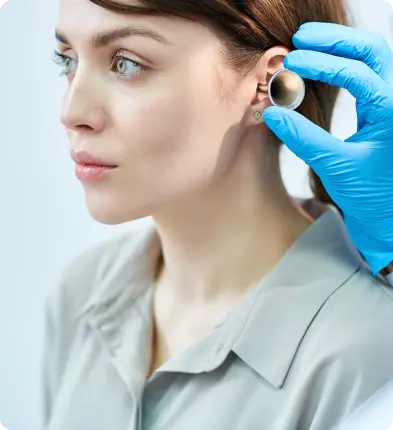Eustachian Tube Dysfunction (ETD)-related tinnitus occurs when the Eustachian tube, which connects the middle ear to the nasopharynx, fails to properly regulate pressure, leading to ear fullness, hearing changes, and tinnitus (ringing or buzzing). Remedies focus on restoring Eustachian tube function and relieving pressure imbalance.
Causes of Eustachian Tube Dysfunction (ETD)
Eustachian Tube Dysfunction (ETD) occurs when the tube that connects the middle ear to the back of the throat fails to open properly, leading to pressure imbalances, ear fullness, and sometimes tinnitus. The causes can be mechanical blockages, inflammation, or functional issues.
Primary Causes of ETD
1. Upper Respiratory Infections (Colds, Sinusitis, Flu)
- Why? Mucus and swelling block the Eustachian tube.
- Symptoms: Ear pressure, popping, temporary hearing loss.
2. Allergies (Allergic Rhinitis)
- Why? Histamine release causes nasal congestion and swelling around the Eustachian tube.
- Common Triggers: Pollen, dust mites, pet dander.
3. Chronic Sinusitis & Nasal Polyps
- Why? Persistent inflammation physically obstructs the Eustachian tube opening.
4. Rapid Pressure Changes (Barotrauma)
- Why? Sudden altitude changes (flying, diving) can overwhelm the tube’s ability to equalize pressure.
- Symptoms: Pain, muffled hearing, tinnitus.
5. Acid Reflux (LPR – Silent Reflux)
- Why? Stomach acid irritates the nasopharynx, leading to swelling near the Eustachian tube.
6. Smoking & Air Pollution
- Why? Irritants cause chronic inflammation and mucus buildup.
7. Enlarged Adenoids (Common in Children)
- Why? Large adenoids physically block the Eustachian tube opening.
8. TMJ Disorders (Jaw Misalignment)
- Why? Jaw tension can affect muscles near the Eustachian tube, impairing its function.
9. Hormonal Changes (Pregnancy, Thyroid Issues)
- Why? Fluid retention and mucosal swelling affect tube function.
10. Chronic ETD (Patulous Eustachian Tube)
- Why? The tube stays abnormally open, causing autophony (hearing own breathing).
Less Common but Serious Causes
- Tumors (Nasopharyngeal carcinoma)
- Eustachian Tube Stenosis (Narrowing from scarring)
- Cleft Palate (Anatomical dysfunction in children)
How to Identify the Cause?
- Allergies? → Try antihistamines, nasal steroids.
- Recent cold/sinus infection? → Decongestants, steam inhalation.
- Frequent flying/diving? → Auto-inflation techniques before pressure changes.
- Acid reflux? → Diet changes, PPIs (e.g., Omeprazole).
- Chronic symptoms? → See an ENT for imaging or balloon dilation.
Would you like guidance on diagnosing your specific case?
Best Eustachian Tube Dysfunction Tinnitus Remedy
1. Autoinflation (Valsalva Maneuver & Toynbee Maneuver)
- Valsalva Maneuver: Pinch nostrils, close mouth, and gently blow to open the Eustachian tube.
- Toynbee Maneuver: Swallow while pinching nostrils to help equalize pressure.
- Effectiveness: Best for immediate (but temporary) relief of pressure-related tinnitus.
2. Nasal Decongestants & Steroid Sprays
- Examples: Oxymetazoline (Afrin) for short-term relief, Fluticasone (Flonase) for long-term inflammation.
- How it helps: Reduces nasal swelling, allowing the Eustachian tube to open.
3. Antihistamines (For Allergy-Induced ETD)
- Examples: Loratadine (Claritin), Cetirizine (Zyrtec).
- How it helps: Reduces mucus and inflammation blocking the Eustachian tube.
4. Eustachian Tube Balloon Dilation (Surgical Option)
- Procedure: A balloon is inserted into the Eustachian tube and inflated to widen it.
- Effectiveness: Long-term solution for chronic ETD-related tinnitus.
5. Chewing Gum or Yawning
- How it helps: Promotes swallowing and jaw movement, which can help open the Eustachian tube.
6. Warm Compress & Steam Inhalation
- How it helps: Moist heat can reduce congestion and improve Eustachian tube function.
7. Avoiding Rapid Pressure Changes
- Examples: Avoid flying or diving with active ETD symptoms.
Best Example Remedies in Practice
- For Sudden ETD Tinnitus: Valsalva maneuver + nasal decongestant (Afrin).
- For Chronic ETD Tinnitus: Daily Flonase + antihistamine (Zyrtec) + balloon dilation if persistent.
- For Allergy-Related ETD: Nasal steroids + saline rinses + avoiding allergens.
When to See a Doctor
- If tinnitus persists > 2 weeks.
- If accompanied by hearing loss or vertigo (could indicate Meniere’s disease).
Would you like recommendations for specific supplements (e.g., magnesium for nerve-related tinnitus)?

